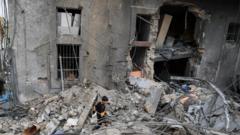The recent Israeli air strike on Al Ahli Arab Hospital in Gaza City has resulted in extensive damage to its critical care facilities, raising alarms over healthcare access in the region. Witnesses report large flames and smoke engulfing the premises as patients were hastily evacuated, leading to significant distress. The Israeli Defense Forces (IDF) claimed the hospital was harboring Hamas operations, but the attack has drawn international condemnation due to the hospital's role as the last functional medical center in the city amidst ongoing conflict.
Israel Strikes Last Functional Hospital in Gaza City, Al Ahli Arab Hospital

Israel Strikes Last Functional Hospital in Gaza City, Al Ahli Arab Hospital
An Israeli air strike has targeted Gaza's Al Ahli Arab Hospital at a critical moment, leading to severe damage and evacuations.
The attack saw the destruction of the hospital's intensive care and surgery departments, triggering an urgent evacuation process. While no immediate casualties were reported, a statement from the Episcopal Diocese of Jerusalem indicated that a child died due to the chaotic evacuation environment. Witness accounts detailed the panic as both patients and staff fled under threat, with one father describing their near escape with his injured daughters from imminent danger.
International organizations and officials, including the Director-General of the World Health Organization, emphasized the violation of humanitarian principles governing medical facilities. The strife highlighted the ongoing health crisis as the hospital was already stretched thin due to prior conflicts that had damaged other medical facilities. Calls for the protection of hospitals and healthcare workers in conflicts were echoed globally, stressing the pressing need for an end to such attacks. With the situation in Gaza becoming increasingly desperate amid ongoing violence, the implications for civilians remain grave as healthcare capabilities dwindle.
The attack on Al Ahli, particularly poignant as it coincided with Palm Sunday, has intensified global outrage and highlighted the ongoing humanitarian crisis in Gaza. The war began in response to an unprecedented cross-border attack earlier in the month, resulting in substantial casualties on both sides. The future for both the hospital and broader healthcare access in Gaza remains uncertain as violence continues.
This situation necessitates urgent calls for de-escalation and protection of vulnerable populations, notably children and the sick, amid the atrocities of war.
Al Ahli Arab Hospital, once a haven for the critically ill, now finds itself in ruins—a stark reminder of the devastating impact of conflict on civilian healthcare infrastructures.
International organizations and officials, including the Director-General of the World Health Organization, emphasized the violation of humanitarian principles governing medical facilities. The strife highlighted the ongoing health crisis as the hospital was already stretched thin due to prior conflicts that had damaged other medical facilities. Calls for the protection of hospitals and healthcare workers in conflicts were echoed globally, stressing the pressing need for an end to such attacks. With the situation in Gaza becoming increasingly desperate amid ongoing violence, the implications for civilians remain grave as healthcare capabilities dwindle.
The attack on Al Ahli, particularly poignant as it coincided with Palm Sunday, has intensified global outrage and highlighted the ongoing humanitarian crisis in Gaza. The war began in response to an unprecedented cross-border attack earlier in the month, resulting in substantial casualties on both sides. The future for both the hospital and broader healthcare access in Gaza remains uncertain as violence continues.
This situation necessitates urgent calls for de-escalation and protection of vulnerable populations, notably children and the sick, amid the atrocities of war.
Al Ahli Arab Hospital, once a haven for the critically ill, now finds itself in ruins—a stark reminder of the devastating impact of conflict on civilian healthcare infrastructures.





















